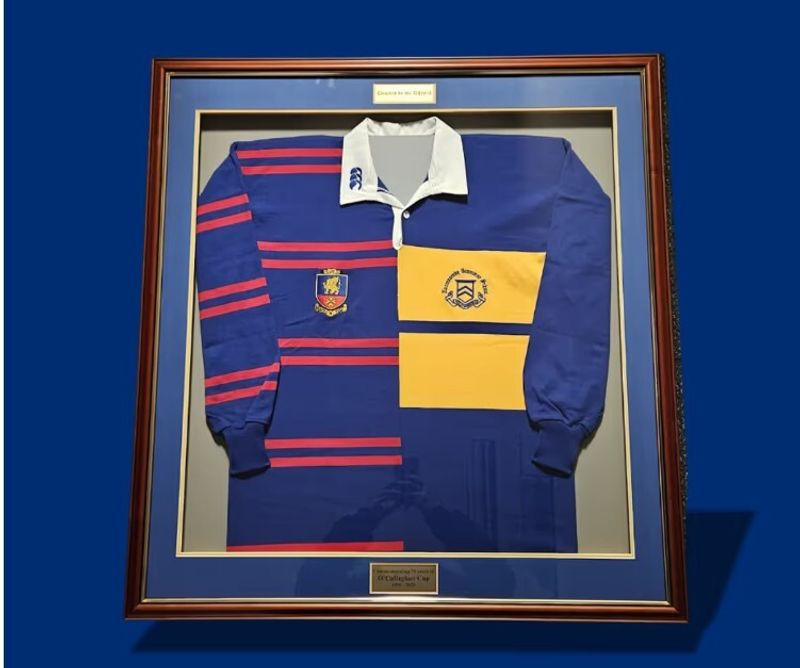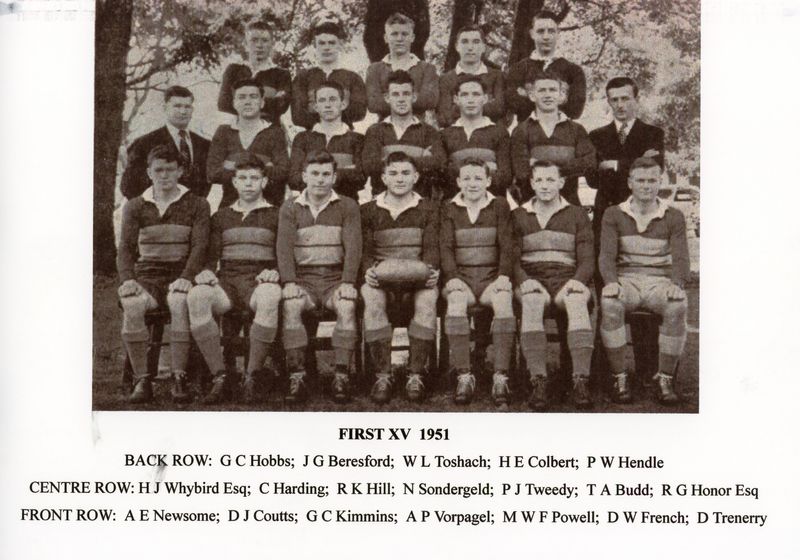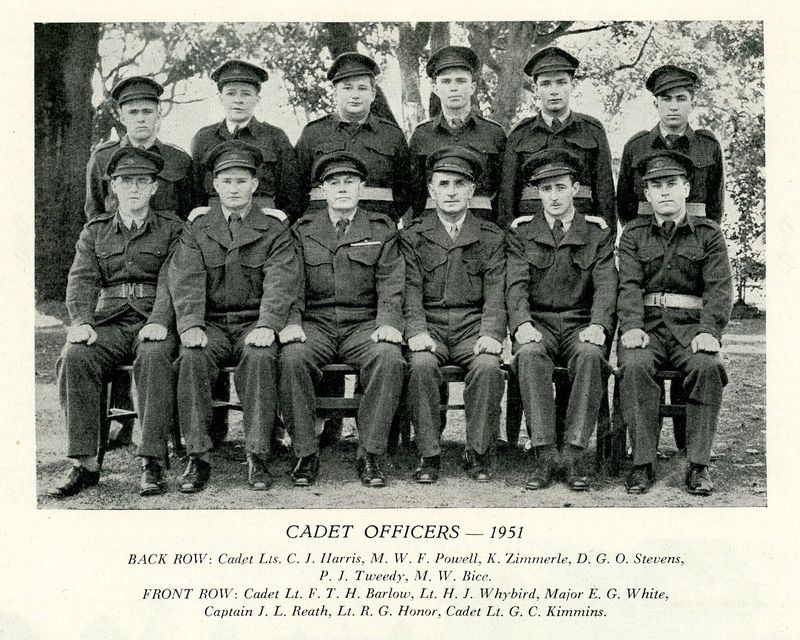“I ended up with a tag in my head and bled a lot but had no idea how bad it was until halftime. That was rugby in those days, rougher, harder and you just kept going.”— Malcolm Powell, TGS 1948-52

On Saturday, 16 August, Toowoomba Grammar School and Downlands College will take to the field once more for the 76th annual O’Callaghan Cup, an iconic rugby fixture rich in tradition, rivalry and pride.
This year’s match holds special meaning, as it marks 75 years since the very first O’Callaghan Cup clash in 1950. Among those who remember the early days is Malcolm Powell, a proud TGS Old Boy (1948-52) who played fullback for the First XV in 1951.
Malcolm, now in his nineties, still vividly recalls the thrill of those early games.
“I watched the first Cup from the sidelines, I was in the Thirds that year,” Malcolm recalls.

“Downlands won that match (15-6), but that was fitting really because they had donated the Cup after all.”

The following year, Malcolm was excited to be selected for the First XV and had the privilege of taking the field.
“We won that match pretty easily (6-0),” he says. “We led from start to finish.”
And it was a tough game.
It was a different era, there was no grandstand tunnel, no media build-up and only a few hundred spectators.
“It didn’t have the hype like it does now,” Malcolm reflects. “There wasn’t the crowd or the fanfare, but we were so proud to play. At the end of the game we just shook hands, accepted the result and waited for the presentation. It was about the game.”
That game in 1951 was one of two that year, an unusual occurrence.

“I don’t remember why we had two,” he chuckles. “Might have been the wet weather playing havoc with the GPS season and we needed to pick up an extra game. But I remember the cheering when we won. That always stays with you.”
Malcolm has watched the O’Callaghan Cup grow from a modest schoolboy fixture into a celebrated event drawing thousands of spectators each year.
“It’s amazing to see what it’s become. I’ve been to quite a few games over the years. I love the atmosphere, and the boys always put on a great game. I hope to be there this year. TGS needs the win!”
Currently, the tally stands even: 36 wins apiece with three draws - testament to the fierce but respectful rivalry between the schools.
“It’s always been about sportsmanship as much as competition,” Malcolm notes.
Beyond rugby, Malcolm embraced every part of school life. A Prefect in 1951, he was involved in athletics, swimming, cricket, cadets and school plays.

“I was sport mad,” he admits. “But what I loved most was the camaraderie. Mates were mates. You could rely on each other—something that came from the spirit of the times after the War.”
His achievements speak volumes about his character. In 1951 alone, he was named Best All-Rounder and he won numerous Speech Day prizes from 1948 to 1951, including the Belford Prize and the Kelvin Boys Memorial Prize for English and Physics. A scholarship to university to study Engineering followed, made possible by his academic excellence.
“TGS was a great place for me,” Malcolm says. “My older brother was there too. He helped guide me. The Headmaster set a good example, we had to stand up and own our actions. That stayed with me.”
From the bloodied rucks of the 1950s to today’s fast-paced matches, Malcolm Powell has witnessed firsthand the enduring legacy of the O’Callaghan Cup and the spirit of Toowoomba Grammar School. His memories are more than stories they’re part of the fabric that has shaped 75 years of tradition.
As the current First XV prepares to take the field, they carry with them the hopes of the School and the pride of those who came before them. If you’re at the game this year, look out for Malcolm in the crowd. He’ll be there, cheering on the Blue and Gold, just like he’s so many years before.
More information about the history of Grammar Downlands Day and this year’s program of events is available on our website.
Latest Blog
Helpful Tips for New Boarding Parents
Name absolutely everything! Socks, undies, phone chargers, water bottles, caps. EVERYTHING!! Make sure you name items with Boy’s name & House number; most parents will put their senior house number if printing the tags so they don’t have to rename items when they move the following year (Corfe House doesn’t have a house number). Some boys find a double bed doona is a better option than single doona as it hangs down the sides of the bed a little more to keep them warmer in winter. An…
Parenting Styles: Parties and the Holidays
As the holiday season approaches, parents and caregivers find themselves immersed in the joy and bustle of festivities. Amidst the celebrations, it’s essential to pause and reflect on the pivotal role our parenting styles play in shaping our children’s attitudes and behaviours, especially concerning alcohol and other drug use. As a father of four young people with my fifth child coming into our family on 8 December 2023, I’m particularly mindful of my parenting style and my role as School…
Building the Boarding Experience - at Home
Family connections is a vital aspect of our Toowoomba Grammar School boarding program that we hold close to our heart. Our Heads of House regularly make the effort to visit our boarding families so they have a better understanding of our boarders' lives, the challenges and experiences, and staff always enjoy the warmth and hospitality provided by families. Head of Corfe House, Henry White and his wife, Samantha recently spent a weekend with the Acton family on Dalgonally Station near Julia…
A New Season for Coach Kabe
Highly respected Head of Basketball and 1st V Coach, Kabe Ciccolini is embarking on a new and inspiring chapter. This season, he takes up the role of Assistant Head of Corfe House, guiding our youngest boarders with a warmth and passion that is uniquely his own. Kabe’s decision to transition into the role of Assistant Head of Corfe House reflects his unwavering commitment to mentorship and leadership. For him, this move signifies a positive step in his career. “It’s an opportunity to further…
Embrace Every Moment
In the words of one of the greatest leaders of all time, Albus Dumbledore, “it does not do to dwell on dreams and forget to live.” The wise wizard spoke these words to Harry as he stood before the Mirror of Erised, a magical artifact that reveals one’s deepest desires. These words tell the story of the balance between our dreams and the richness of the present moment. We live in a world that often urges us to focus on our aspirations; , sometimes we get so lost in our dreams that we do not…
What is the TGS Athletic Development Academy?
As a TGS Old Boy (2003-14), sport has always been an integral part of my upbringing. As a young boy I discovered the joys of cricket, track and field and touch footy. This love of being active led me to studying Exercise Science at University and I was fortunate enough to work with a range of national and international level athletes, culminating in an internship at the Brisbane Broncos. This experience launched my career in the strength and conditioning space, allowing me to work with…
The Boarding and Day Family Connections
My husband Ben and I are four years into our boarding journey at Toowoomba Grammar School, we have two boys in Mackintosh House, Josh in Year 10 and Archie in Year 9, and a daughter Ella who is home with us for one more year before we become empty nesters. We are in the fortunate position that we live reasonably close, so we have the privilege of taking our boys home often and can attend most School events. For many of our boarding families, this is not the case, they live great distances away…
Streamline Success
Education is a transformative journey where the path we choose exerts a profound influence on our ultimate success. A streamed class is like an express locomotive: swift, efficient, and filled with eager passengers zooming towards their educational destination. Meanwhile, an unstreamed class resembles a motley group of hikers who accidentally wandered onto the wrong trail, stumbling and bickering as they struggle to find their way. Imagine the express locomotive of streamed classes, full of…
Reducing Stress: the Key to a Peaceful Life
Have you ever felt the soul-crushing burden of stress dragging your life through the mud? Ever had your precious time dwindled away at the hands of stress, while you are left powerless and alone? Well all this pain and anguish can be resolved in an instant; and all it takes is a change in the way we think. This alteration in brain chemistry is defined as mindfulness, the ability to obtain momentary awareness and recognition of our thoughts and feelings. Mindfulness is the key to defeating…